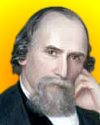 (source)
(source)
|
Henri-Frédéric Amiel
(27 Sep 1821 - 11 May 1881)
Swiss philosopher and poet who wrote Journal Intime (published posthumously, 1883-84), his introspective diary kept from 1847. He was professor of aesthetics (1849) and moral philosophy (1853) at Geneva.
|
Science Quotes by Henri-Frédéric Amiel (16 quotes)
…the ideal doctor would be a man endowed with profound knowledge of life and of the soul, intuitively divining any suffering or disorder of whatever kind, and restoring peace by his mere presence.
— Henri-Frédéric Amiel
Amiel's Journal The Journal Intime of Henri-Frederic Amiel (22 Aug 1873), trans. By Mrs Humphry Ward (1889), Vol 2., 153.
[I]t is truth alone—scientific, established, proved, and rational truth—which is capable of satisfying nowadays the awakened minds of all classes. We may still say perhaps, 'faith governs the world,'—but the faith of the present is no longer in revelation or in the priest—it is in reason and in science.
— Henri-Frédéric Amiel
Entry for 15 Nov 1876 in Amiel’s Journal: The Journal Intime of Henri-Frédéric Amiel, trans. Humphry Ward (1893), 234.
[T]he habit of scientific analysis … exhausts the material offered to it…
— Henri-Frédéric Amiel
Entry for 1 Sep 1875 in Amiel’s Journal: The Journal Intime of Henri-Frédéric Amiel, trans. Humphry Ward (1893), 225.
An error is the more dangerous in proportion to the degree of truth which it contains.
— Henri-Frédéric Amiel
Entry for 26 Dec 1852 in Amiel’s Journal: The Journal Intime of Henri-Frédéric Amiel, trans. Humphry Ward (1893), 34.
Common sense is the measure of the possible; it is composed of experience and prevision; it is calculation applied to life.
— Henri-Frédéric Amiel
Entry for 26 Dec 1852 in Amiel’s Journal: The Journal Intime of Henri-Frédéric Amiel, trans. Humphry Ward (1893), 34.
Dreams are excursions into the limbo of things, a semi-deliverance from the human prison.
— Henri-Frédéric Amiel
Amiel's Journal The Journal Intime of Henri-Frederic Amiel, (3 Dec 1872), trans. By Mrs Humphry Ward (1889),131.
Health is the first of all liberties, and happiness gives us the energy which is the basis of health.
— Henri-Frédéric Amiel
Amiel's Journal The Journal Intime of Henri-Frederic Amiel, (3 Apr 1865), trans. By Mrs Humphry Ward (1889),104.
Life is short and we have not too much time for gladdening the hearts of those who are traveling the dark way with us. Oh, be swift to love! Make haste to be kind.
— Henri-Frédéric Amiel
Entry for 16 Dec 1868 in Amiel’s Journal: The Journal Intime (1896), Vol. 2, 15, as translated by Mrs. Humphry Ward.
Pure truth cannot be assimilated by the crowd; it must be communicated by contagion.
— Henri-Frédéric Amiel
Entry for 26 Oct 1875 in Amiel’s Journal: The Journal Intime of Henri-Frédéric Amiel, trans. Humphry Ward (1893), 227.
Society lives by faith, develops by science.
— Henri-Frédéric Amiel
Entry for 7 May 1870 in Amiel’s Journal: The Journal Intime of Henri-Frédéric Amiel, trans. Humphry Ward (1893), 169.
Society rests upon conscience, not upon science.
— Henri-Frédéric Amiel
In James Wood, Dictionary of Quotations from Ancient and Modern, English and Foreign Sources (1893), 396:36.
There is no curing a sick man who believes himself to be in health.
— Henri-Frédéric Amiel
Amiel's Journal The Journal Intime of Henri-Frederic Amiel, (6 Feb 1877), trans. By Mrs Humphry Ward (1889),131.
To do easily what is difficult for others is the mark of talent. To do what is impossible for talent is the mark of genius.
— Henri-Frédéric Amiel
Entry for 17 Dec 1856 in Amiel’s Journal: The Journal Intime of Henri-Frédéric Amiel, trans. Humphry Ward (1893), 60.
To know how to grow old is the master-work of wisdom, and one of the most difficult chapters in the great art of living.
— Henri-Frédéric Amiel
Amiel's Journal The Journal Intime of Henri-Frederic Amiel, (21 Sep 1874), trans. By Mrs Humphry Ward (1889),177.
True poetry is truer than science, because it is synthetic, and seizes at once what the combination of all the sciences is able, at most, to attain as a final result.
— Henri-Frédéric Amiel
Entry for 31 Oct 1852 in Amiel’s Journal: The Journal Intime of Henri-Frédéric Amiel, trans. Humphry Ward (1893), 30.
Understanding … must begin by saturating itself with facts and realities. … Besides, we only understand that which is already within us. To understand is to possess the thing understood, first by sympathy and then by intelligence. Instead of first dismembering and dissecting the object to be conceived, we should begin by laying hold of it in its ensemble. The procedure is the same, whether we study a watch or a plant, a work of art or a character.
— Henri-Frédéric Amiel
(7 Apr 1886). In Mary A. Ward (trans.), Amiel’s Journal: The Journal Intime of Henri-Frédéric Amiel (1889), 119.
 In science it often happens that scientists say, 'You know that's a really good argument; my position is mistaken,' and then they would actually change their minds and you never hear that old view from them again. They really do it. It doesn't happen as often as it should, because scientists are human and change is sometimes painful. But it happens every day. I cannot recall the last time something like that happened in politics or religion.
(1987) --
In science it often happens that scientists say, 'You know that's a really good argument; my position is mistaken,' and then they would actually change their minds and you never hear that old view from them again. They really do it. It doesn't happen as often as it should, because scientists are human and change is sometimes painful. But it happens every day. I cannot recall the last time something like that happened in politics or religion.
(1987) -- 


